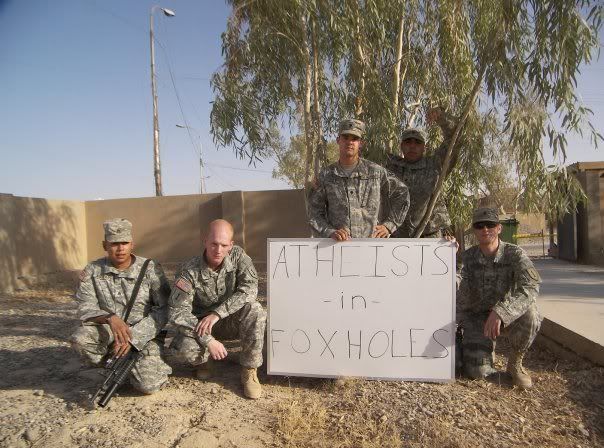I get this a lot in discussions with theists, especially Christians, and while I'm sure most readers of Second Enlightenment have had it thrown at them so many times that every mention simply elicits a
*headdesk*, I think it's worth going over. The argument goes something like this:
It requires just as much faith to NOT believe in God as it does to believe in him.
There are variations on this erroneous argument, the most common of which is that atheism is, in fact, just another religion.
Yeah, and NOT playing baseball is a cherished past-time; and NOT being a lawyer is a profession; and NOT collecting stamps is a hobby.
The fact is that people of all stripes reject ridiculous things all the time, and it doesn't require any measure of "faith" to do so. It doesn't take faith to believe that 9/11 WAS NOT the result of a vast government conspiracy; or that the moon landings WERE NOT merely a Hollywood production. All it takes is a serious look at the evidence, and in the case of 9/11, there's no real evidence to suggest that the attacks were anything other than the product of, to use
South Park's description, a "bunch of pissed-off Muslims."
Similarly, all it takes is a trip to places like the
Museum of Science and Industry in Chicago to see one of the actual
command modules used in the Apollo moon missions (this one being
Apollo 8, which carted Jim Lovell in his first trip around the moon, the second trip of his being the more famous
Apollo 13), as well as some of the moon rocks the astronauts brought back, not to mention all the other great things the MSI has in its Henry Crown Space Center exhibit.
But I'm not here to talk about nutjob conspiracy theories, we're talking about why faith is not required for atheism. I suppose the main reason why atheism does not require faith is because it is, essentially, a null position. This is different from an outright negative position. Instead, it is an acknowledgment that the existence of any god or gods is infinitely
improbable, and is not worth serious consideration without proper evidence or logic to back it up. Thus, because the Christian, Islamic, Jewish, Hindu, Zoroastrian, and all other theistic gods share the same infinite improbability as such mythical ideas as unicorns, dragons, goblins, faeries, Bigfoot, the Loch Ness Monster, and the idea that Elvis is still alive (though, admittedly, it makes for a
damn funny movie), they are consequently just as easy to reject. If atheism were a positive assertion (like theism), and did not have any reasonable arguments or evidence in its favour (also like theism), then yes, it would require a leap of faith (again, like theism) to accept it in whole or in part.
Simply because something is
possible does not mean that anyone should give it serious consideration without adequate reason to do so. This is why the
Flying Spaghetti Monster is such a poignant example: it has just as much probability for being true as Yahweh. It takes the same amount of "faith" to dismiss the FSM as it does to dimiss Yahweh, which is to say, none at all. Richard Dawkins summed it up nicely in his most recent book
The God Delusion. On a scale of 1 to 7, where 1 is certitude that God exists and 7 is certitude that God does not exist, Dawkins rates himself a 6: "I cannot know for certain but I think God is very improbable, and I live my life on the assumption that he is not there." This is not faith, but rather
HONEST COMMON SENSE! Insert the word "faeries" or "dragons" or "unicorns" in the place of "God" and this fact becomes clear. It's simple common sense NOT to believe in any of those things, because there is no good reason to do so; and admitting the fact that the thing in question can't be definitively said to NOT exist is not a case for faith, it is merely being intellectually honest. Any theist who claims otherwise is doomed to end up in the philosophical cul-du-sac of solipsism, usually without realizing that it is equally detrimental to their own beliefs as well as those they're attacking. Solipsism is, in a word, useless, worthless, irrelevant, or whatever other synonym you prefer.
Additionally, I think theists who claim that faith is required for atheism devalue their own faith, since it's definitely easier NOT to accept the improbable than to believe in it without reason (and that's speaking as a former believer). But as is usually the case, theists are so intent at winning an argument at any cost that they fail to realize just how ridiculous they've become in the process.
But then, that's the real tragedy of religious belief, isn't it?


.jpg)


